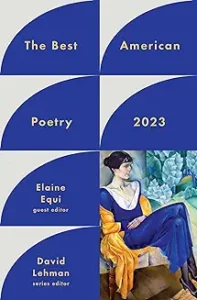The Best American Poetry 2023 ed Elaine Equi 2023
I have tended to avoid reading the volumes in the Best American Poetry series because I’ve found it somewhat overwhelming to read 75 or more poems by 75 or more different poets. The lack of a consistent style, theme, structure, viewpoint makes the question of ‘how to read a volume of poetry’ even more daunting than a ‘selected’ or ‘collected’ pile of one poet’s work.
But this year’s volume sitting on the cart of ‘to be shelved’ books at the Cambridge Public Library caught my eye. The cover’s design was eye-catching, but what drew me to the book was the guest editor’s name, Elaine Equi. Equi??? I had not heard of her which was unusual for this series which in the recent past had featured Tracy Smith, Major Jackson, Dana Gioia, Natasha Trethaway, and Edward Hirsch as guest editors, all poets whose work I knew. Who was Elaine Equi and what was the ethnic/national background of that name? When I read that Equi had been born in Oak Park where I had gone to high school, I was hooked, and having now read the 75 poems she chose, I am now hooked on the series.
Each of these Best volumes is introduced by David Lehman who launched the Best American Poetry series in 1988 and who has chosen the guest editor and written the Foreword for each volume. Lehman, who also has a poem in this edition, always has an erudite and interesting essay, and this year is no exception featuring his comments about two poets who died in the past year, Richard Howard and Charles Simic. Equi’s introduction is also very well done and concludes with comments about how she chose these 75 poems from among the hundreds, perhaps thousands that she read in magazines and on-line. She wrote: “I know every age has its moments of crisis—its reasons for hope and despair and writers who respond to them. This anthology is no different. Some of these poems deal with mortality, aging, loss, grief, racism, injustice, feminism, identity, war, and extinction. Other poems offer prayers, praise of beauty, musings on space travel and technology, as well as celebrations of love, birth, and other new beginnings. And I’ve made sure to include poems that are inspired by the absurdities and even goofiness of our current culture and everyday life. The intelligence, emotional honesty, and originality of these poets have inspired me, and I’m hopeful they will inspire you, too, as you face your own unique set of challenges.”
And, true to her goal, I was inspired by many of these works. Before quoting my favorite poem in the collection, I’ll comment on the final 50 pages of this book in which each author has written a brief autobio and a comment about his/her poem. This section of the Best series has grown over the years as the poets have expanded the summary of their artistic lives—where and what year they were born (The 60-80 year old poets seem to be over-represented.), the titles of their published books (These lists vary from one or two books to Anne Waldman who has authored more than 60 books of poetry.), the awards they’ve won (There seems to be an almost endless list of poetry awards ranging from the widely known Pulitzer and National Book Award to obscure ‘named’ awards.), and where they now live (many, many in NYC) and where they teach (Again a wide variety from Princeton to community colleges, more than 15 of these poets are professors.) and what journals they edit. The richness of this world of poetry was simply incredible and made me conscious of how little I know of it. Of the 75 poets, I recognized the names of nine, drawing a blank on the current U.S. Poet Laureate (Ada Limon), a Pulitzer Prize winner (Diane Seuss), and two of the four previous guest editors of this series (Matthew Zapruder and Amy Gerstler). Clearly, I have much to learn.
Choosing a poem to quote was challenging since many were either entertaining or thought-provoking, but in the context of the war in Ukraine, the massacre of Israelis, the continued popularity of the arch-felon trump, and the climate crisis, here’s one that stayed with me by Charles Bernstein entitled ‘Shorter Russian Poem’: famine plague/floods, rains/droughts/poverty, robberies/kidnappings/civil war/invasions/tyrannies upon/tryrannies/….and then/the dark times/came
I’d like to end this review on a lighter note, but I can’t.



